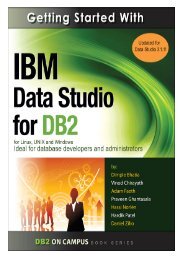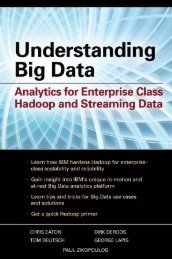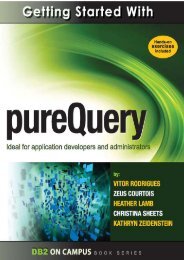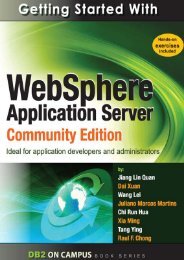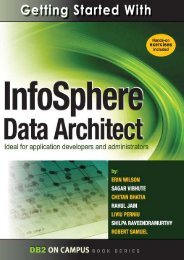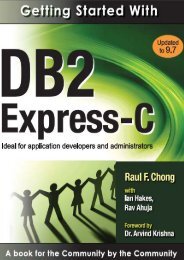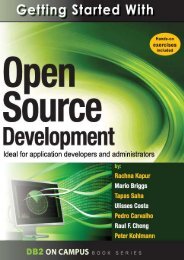Getting Started with Open Source Development
You also want an ePaper? Increase the reach of your titles
YUMPU automatically turns print PDFs into web optimized ePapers that Google loves.
Chapter 5 – Participating in open source development 71<br />
Did you know?<br />
Part of the ranking process on sourceForge comes from downloads but much of the<br />
calculation is driven by community activity. If someone opens a defect, checks in code,<br />
makes a feature request, or posts to a forum page; all of that adds to the relative activity<br />
score and the project’s overall ranking. Projects <strong>with</strong> a high ranking get noticed.<br />
An example of a successful open source project hosted on <strong>Source</strong>Forge is the<br />
Technology Explorer for IBM DB2 (TE). TE has over 10,000 downloads <strong>with</strong> a<br />
sourceforge.org ranking consistently in the top 200 projects and in the top ten of over<br />
13,000 database related projects. To find out more about the Technology Explorer for IBM<br />
DB2 refer to Chapter 8.<br />
A Wiki is a collaborative Web site developed and maintained by a group of people for<br />
knowledge sharing purpose. In an OSS community, active members who are aware of the<br />
various technical details of the project, generally publish their own articles in the form of<br />
tutorials. http://wiki.rubyonrails.org/ is an example of such a wiki maintained by the Ruby on<br />
Rails user group. Wikis are generally open to all for contribution, <strong>with</strong> restriction only to the<br />
deletion of pages.<br />
Feeling the pulse of the community is not restricted to their official communication<br />
channels. Weblogs (also known as blogs) have emerged has one of the most valid means<br />
of sharing thoughts around the Web. You are guaranteed to gather a lot of helpful<br />
information through blog surfing.<br />
Planets are aggregation of blogs. Every major community has one; it’s like a newsletter but<br />
much more effective. Developers write about their work and you get to know what’s<br />
happening from an insider's point of view. It is also one great way members can gain<br />
visibility in the community. After all, being credited for great work is the only and best<br />
payback community members receive; and everyone likes to be appreciated for their work.<br />
Still the best way by far for feeling your community is to meet the members in person. The<br />
most active and passionate members that happen to share the same geographic location<br />
organize themselves once in a while, to go out and get to know each other. These are<br />
called user groups. Look for user groups in your area and go have some fun!.<br />
Meetup.com is a Web site where you can easily arrange a local reunion <strong>with</strong> a specific<br />
theme. The Ruby community has done this. Check it out!, maybe there is one for yours<br />
already.<br />
Some communities go further and organize worldwide conferences, where they can calmly<br />
and effectively discuss the future of the project as well as throw some technical<br />
presentations and boost the morale of everyone involved.<br />
There are other types of meetings, however. FOSDEM, short for Free and <strong>Open</strong> <strong>Source</strong><br />
<strong>Development</strong> European Meeting, is a once in a year event in Brussels. It gathers roughly<br />
five thousand visitors each year. Developers from all major open source projects come<br />
together to exchange knowledge which help promote their community and announce<br />
upcoming changes and innovations.




